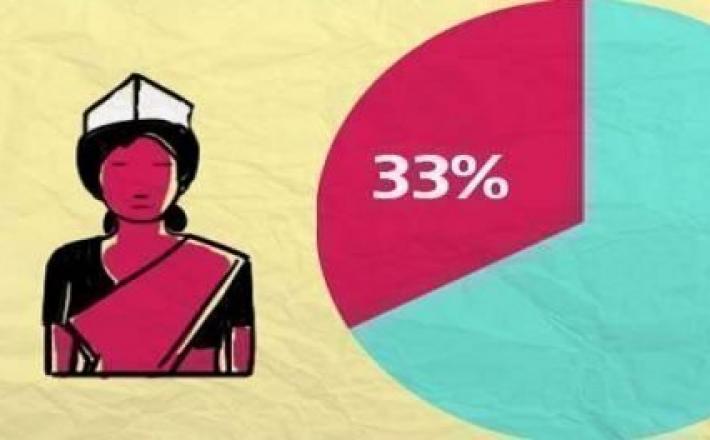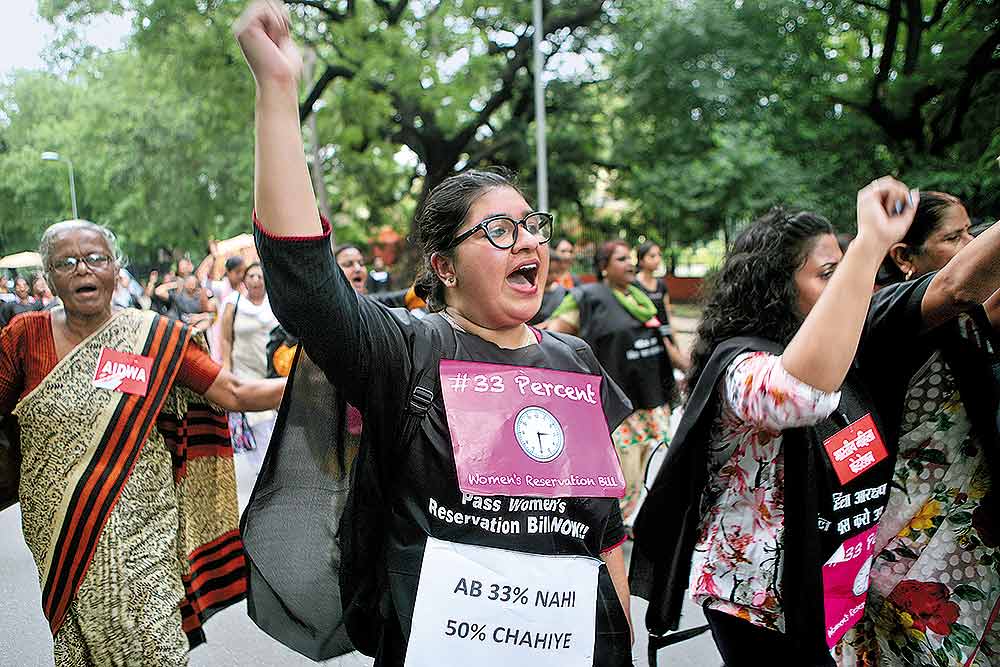After a great debate in the Constituent Assembly, everyone agreed on giving reservation to the backwards after independence whose representation was few in educational institutions and government jobs. Then, on the midnight of August 14–15, 1947, India promised its citizens a better life through human rights, peace, progress, prosperity, equality, and equity. But 75 years after, there is still a wide gap between the claims made in the Constitution and the social legislation for men and women.
The Women’s Reservation Bill has been pending in Parliament for 26 years. Despite all of the promises and claims of ending the gender gap, the Women’s Reservation Bill is one of the Indian Parliament’s longest pending bills. From this, we should understand that women’s interests cannot be protected until and unless we take care of our own front. The question arises as to why this bill has not yet been passed when there was a consensus in the Constituent Assembly that the “underrepresented” people needed to seek mainstream political solutions to their problems.
The gender gap is very deep in almost all of public life. At the time of the elections to use women as the vote bank many political parties promised to fill the gender gap. Some parties have promised women quota-based tickets to contest elections, while others have called for reserved seats in legislatures for women. But these promises turned out to be just a hoax, even after 75 years of independence, women have remained just like a vote bank.
Also read: Muslim Women In Indian Politics: Reservation Proposed by the AIMMM
The Women’s Reservation Bill has been pending in Parliament for 26 years. Despite all of the promises and claims of ending the gender gap, the Women’s Reservation Bill is one of the Indian Parliament’s longest pending bills. From this, we should understand that women’s interests cannot be protected until and unless we take care of our own front. The question arises as to why this bill has not yet been passed when there was a consensus in the Constituent Assembly that the “underrepresented” people needed to seek mainstream political solutions to their problems. This brings us to the argument used to support reservations for women.

The bill was not contrary to parliamentary or constitutional considerations as it followed the 73rd and 74th Constitutional Amendment Acts, which allowed reservation in the new third tier of administration. The Women’s Reservation Bill aimed to ensure that at least one-third of the seats in state and central legislatures were reserved for women.
The United Front government acknowledged the need for reservations and promised to fulfil its Common Minimum Programme, which listed the goals to achieve during its tenure. On September 12, 1996, as the 84th Constitutional Amendment Bill, former Prime Minister Deve Gowda took the lead on the bill to amend the Constitution so that women could be given 33% of seats in the Legislature. The Women’s Reservation Bill was to be passed on the same day, but it was adjourned to the last day of the budget session due to several shortcomings in the bill. The bill could not pass that day because there was no separate quota for women belonging to Other Backwards classes and minorities.
The Women’s Reservation Bills were introduced in Parliament in 1996, 1998, 1999, 2008 and 2010 respectively. But it could never pass due to a lack of equality and justice by not providing quotas for OBC and minority women.

The bill includes the following points:
- One-third of the seats in the Lok Sabha and the Legislative Assemblies of the States to be filled by direct election shall be reserved for women.
- Under clause (1) of Article 330 and clause (1) of Article 332 of the Constitution, one-third of the seats are reserved for women belonging to scheduled castes and scheduled tribes.
- There is no reservation of seats in the Lok Sabha for women from states with less than three seats.
- If the number of seats reserved for SC or ST in a state is less than three, then there is no reservation for women belonging to SC or ST.
- Seats will be set aside for women on a rotation basis.
- There is no reservation of seats for OBC women and minority women.
- There is no reservation of seats for women in the Rajya Sabha or state legislative councils.
Some women can be among the most helpless in Indian society. However, some educated women, mostly from upper castes are privileged in many ways as compared to OBC, SC, and ST women. The lack of OBCs and minority quotas in the Women’s Reservation Bill triggered controversy and protests. At last, the bill was handed over to the joint committee meeting.
Phoolan Devi, also known as the Bandit Queen and a member of the Samajwadi Party, demanded that at least half the seats be set aside for women. She claimed that since women constitute half of the country’s population, they should be given representation commensurate with their numbers.
CPI MP Geeta Mukherjee was in charge of the Joint Select Committee. The committee was formed to find common ground on the complex issues that came up during the brief debate on the bill. In conclusion, the committee said that the bill should be passed in its present form, but reservations for OBCs should be considered in the future “in due course.” This mistake could have been the same as OBCs getting reservations in education and government jobs very late and after massive protests across the country.
The bill was not passed in the 1996 monsoon and winter sessions of Parliament because women MPs “drove out” Lalu Prasad Yadav, Mulayam Singh Yadav, and Sharad Yadav when they began demanding quotas within quotas for OBCs and minority women.
Also read: Women’s Representation In India: Reservations And Beyond
Mulayam Singh Yadav, Lalu Prasad Yadav, and Sharad Yadav said that they would strongly oppose the bill in its current form unless it was changed to include a 10% sub-quota for OBC women. Because they wanted women like Phoolan Devi and Bhagwatiya Devi, who break stones, to also reach parliament. Along with them, some Muslim MPs and their non-Muslim allies also wanted the reservation for women to have a quota for Muslim women. As a result, the discussion in Parliament turned into a veritable battleground, and the budget session ended without any resolution.
In 1996, due to the Women’s Reservation Bill, the Parliament became a battlefield, yet the bill was not passed. The BJP mentioned the Women’s Reservation Bill in their election manifestos, but they put the bill in cold storage, while Congress contested the Uttar Pradesh elections with the slogan ‘Ladki Hun Lad Sakti Hun’, but doesn’t know where the “Ladki” went after the election. Half of the country’s population is repeatedly misled and used as a vote bank, but the promises are never fulfilled.
Samajwadi Party, Rashtriya Janata Dal, was never against the bill, but they wanted quotas for OBC, SC, ST, and minority women, so they opposed it in its current form. The SP-RJD alliance also got support from the BSP, JD (United), and DMK at the last minute on the issue. they promised that they would reject it in its present form and would even start a national movement against it.
Phoolan Devi, also known as the Bandit Queen and a member of the Samajwadi Party, demanded that at least half the seats be set aside for women. She claimed that since women constitute half of the country’s population, they should be given representation commensurate with their numbers.
In 1996, due to the Women’s Reservation Bill, the Parliament became a battlefield, yet the bill was not passed. The popular political parties including the BJP mentioned the Women’s Reservation Bill in their election manifestos, but they put the bill in cold storage, while Congress contested the Uttar Pradesh elections with the slogan ‘Ladki Hun Lad Sakti Hun’, but doesn’t know where the “Ladki” went after the election. Half of the country’s population is repeatedly misled and used as a vote bank, but the promises are never fulfilled. But now the women of the country will have to be empowered and will have to fight to pass the Women’s Reservation Bill with quotas within quota.
About the author(s)
Kanchana is an activist and a researcher, pursuing PhD in computational and integrative
sciences at Jawaharlal Nehru University. She has also been nominated for the "Women of Substance
Network and Award 2023".





